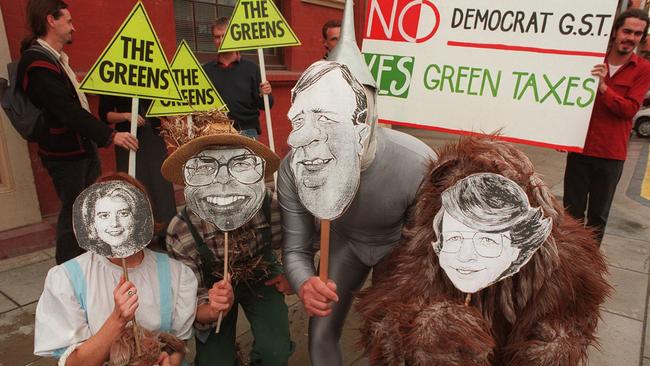Forget GST tinkering and bring in real tax reform
Taxing consumption will do little to help our economy recover from this recession.

Since then, broadening the base or lifting the rate from 10 per cent, or both, has been the recommendation of most economists, and one eagerly taken up by the free-market side of politics.
It would be useful if its stardom faded, though, because GST reform is politically unlikely, and the economic dividends simply aren’t worth the effort.
Labor is diametrically opposed to extending the GST. And even if it weren’t, why would a federal government incur the political pain of increasing the GST, only to send all the revenue to the states — which also have to all agree?
It is encouraging that this subject took up the fewest number of pages, just eight, in the NSW government’s federation and tax review, launched earlier this week by Treasurer Dominic Perrottet.
Far more space was devoted to replacing stamp duty with land tax, improving payroll tax, and replacing petrol excise with road-user charging. These are all bigger and lower-hanging pieces of fruit on the tax reform tree.
Malcolm Turnbull emphasises how difficult further GST would be in his memoir, A Bigger Picture.
Despite being an “article of blind faith” among economists, he notes prime ministers don’t have the “breezy luxury” of simply asserting the virtues of consumption tax. They need real evidence of its economic superiority.
Economically sclerotic Europe, which pioneered consumption taxes in the 1950s and relies on them far more than we do, doesn’t provide much.
“There’s no point changing the GST if we couldn’t show that there was a strong economic benefit,” Turnbull writes.
For the punter, it isn’t blindingly obvious that increasing his after-tax income, only to reduce his purchasing power by jacking up the price of everything, will achieve very much.
The theoretical benefits of taxing consumption instead of income — reducing tax on savings — aren’t immediately obvious either, especially when income tax could never be eliminated entirely.
“By the time everyone else on a lower position was put in a position where they were not worse off — a political necessity — there was less than half of the $30bn increase in GST available for personal income tax cuts,” he writes.
That’s perhaps the biggest impediment undermining the whole point of the reform. Treasury analysis provided to the Turnbull government was clear that GST reform without “compensation” was the only way to extract a significant economic benefit.
While the government’s enormous fiscal response to the coronavirus has been, in effect, a massive redistribution from high to low income-earners, some form of compensation would probably still be a political necessity.
Indeed, any GST reform is more likely to entail an increase in the rate rather than broadening the base, which would be much more beneficial. The share of consumption covered by the GST has steadily shrunk from 60 per cent in 2000 to about 55 per cent. A higher rate would only tilt household spending even more in favour of exempt fresh food, health, education and financial services.
Moreover, lifting the rate once will open the gates to further increases, as Europe’s experience shows. Lifting consumption tax is much easier politically than lifting income tax because the former doesn’t affect anyone’s take-home pay.
Recall the Rudd government made it illegal for businesses to quote prices exclusive of GST, ostensibly to make shopping easier. A cynic would say it was to make the GST, which raised about $70bn this year, less salient. Governments strive to make taxes as invisible and painless as possible, but put their spending up in lights.
Indeed, stamp duty has the same property — it’s a relatively hidden tax, paid annually by very few people. It is a far worse tax than income tax, destroying more than $1 in economic value for every dollar it raises compared with 40c for income tax and 10c for the GST, according to NSW.
“We discriminate in favour of older people with savings, who often pay little tax, and against young people trying to get ahead, who pay high rates of personal income tax,” Turnbull writes, correctly singling out a far bigger problem with the tax system than an imbalance between consumption and income tax.
Perhaps no other nation has such advantageous tax arrangements for over-60s, which are by far the wealthiest cohort in society. This generation has also enjoyed the greatest appreciation in asset prices in history. The younger generations, many now unemployed with precarious economic futures, face a huge future tax bill.
It wasn’t a chapter in the NSW discussion paper, but a more urgent tax reform “swap” would be to reduce income tax rates on the young, working poor and lift income tax on the old, idle rich. That would pay a far bigger economic dividend than fiddling with the GST base or rate.
A worker earning $100,000 pays tax at a marginal rate of almost 50 per cent when the 10 per cent GST is factored in. Unless they stand to inherit, they have little hope of getting ahead even on an average income, let alone a low one.
Meanwhile, earnings on superannuation funds for the over-60s pay zero tax. And retirees enjoy a special higher tax-free threshold. Of course, they did pay tax when accumulating their wealth.
A modest increase in tax on superannuation earnings — perhaps sold as a “thank you” to the rest of society for enduring a recession to protect the older generation — would have negligible impact on work incentives.
Introducing a GST was a major achievement of the Howard government — more, though, for removing the complex array of wholesale sales taxes than preceded it, than for cutting income tax. Bracket creep ensures income tax increases relentlessly without government lifting a finger.
Tax reform can be glacial. A consumption tax was a recommendation of the Asprey review in 1975, a generation before the GST became a reality.
The coronavirus crisis could help speed up reform. The political imperative to produce a budget surplus has evaporated, given the huge deficits on the horizon for the foreseeable future.
Governments should take advantage of this situation to make tax reforms, which, in the short term at least, might increase the deficit.
To watch the exclusive subscriber-only online event Q&A: Rebuilding Australia’s Economy with Adam Creighton in conversation with Treasurer Josh Frydenberg on Tuesday, July 7, at 7.30pm, register now at theaustralianplus.com.au




The GST has long been the star of Australia’s tax system, drawing the bulk of media and policy attention. Before it was introduced by the Howard government 20 years ago this week, it was considered the holy grail of tax reform.